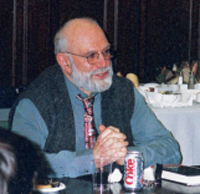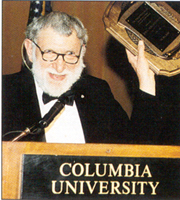 |
 |
 |
 |
|
AROUND THE QUADS: CAMPUS BULLETINS CONTINUED [ 3 OF
3]
“General Chemistry,” the two-semester introductory course, requires even the most die-hard natural scientist in training to flex literary muscles. The ChemWrite program asks each student in the course to write one paper each semester about a book on a list that the department selects. Papers are graded by preceptors from the Logic and Rhetoric course and count for 18 percent of the final grade. As Professor of Chemistry Len Fine, who administers the program, says, ChemWrite is an attempt to “bridge Core Curriculum and science requirements.” Each semester has a different book list, although, as Fine notes, the fall list is “less eclectic” than the eight-book spring list, which this year included Uncle Tungsten. The program is seven years old, though this is only the second year that an author was invited to talk with students (and Logic and Rhetoric preceptors). In a nice coincidence, Sacks dedicated Uncle Tungsten to his friend, Nobel laureate Roald Hoffman ’58, who was the guest last year in the ChemWrite program. Thirty-five students and faculty gathered to hear Sacks, who is also the author of The Man Who Mistook His Wife for a Hat and Awakenings, which was made into a film of the same title starring Robin Williams (as a neurologist, a character based on Sacks) and Robert DeNiro (as his patient). Sacks describes Uncle Tungsten as “an eccentric book which is part personal and part chemical.” The book recounts his early adolescence in post-World War II London, when he was “crazy” about chemistry. “I wanted to become a 19th-century chemist, which no longer exists,” he said. In a wide-ranging question-and-answer session, Sacks admitted that though he was nicknamed “Inky” as a boy because of all the journals he kept, he only began thinking of himself as a writer a couple of years ago. “My strength and my weakness is that I can’t think without writing,” he said. Fine hopes that he can continue to bring authors to campus as part of ChemWrite. “It’s an enjoyable opportunity to force feed you all with literature in the chemistry program,” he told the students.
Vinciguerra, who has been dubbed “avatar of the society” for his role in resuscitating the group, spoke about the Philos’ two centuries of distinction. “Philo is diversity incarnate,” he said. “No other campus group so readily accommodates more libertines, reactionaries and radicals, feminists and misanthropes, aesthetes and bohemians, the doctrinaire and the unorthodox.” Vinciguerra also read congratulatory letters from Philo alumni Ben Stein ’66 (see page 16) and Ted Hoffmann ’44, who could not attend the dinner. Dean Austin Quigley also was on hand to praise the Philos’ longevity and goals. The society helps “students to emerge from the University in ways that are continuous with Columbia’s great tradition of trying to produce students who are intellectual and social explorers, and not mere experts,” he said. “Congratulations again on your first 200 years of the society, and I look forward to meeting you all in this room at the same time 200 years from now.” Poet and Yale professor John Hollander ’50 received the first Philolexian Award for Alumni Literary Achievement and delivered the keynote address, in which he recounted his student days and the group’s history. “Whatever discontinuities in the nature of Philolexian we may observe between then and now — of letter and spirit, form and function, ceremony and belief — any institution in modern life that has survived for two centuries without noticeably having contributed to human misery can surely celebrate its bicentennial without embarrassment,” he said. Marla Diamond ’03 Barnard served as mistress of ceremonies for the evening. Philo alumni who spoke included Michael Marubio ’87, Rachel Kahn-Troster ’01 Barnard, the group’s “moderator emerita,” and Walter Wager ’44. Alumni present included Special Service Professor Wm. Theodore de Bary ’41, William Peterfield Trent Professor of English and Comparative Literature John Rosenberg ’50, Donn Coffee ’55 and former CCT editor Jamie Katz ’72. |
|
|||||||||||||||||||||||||||||||||||||||||||||||||||||

